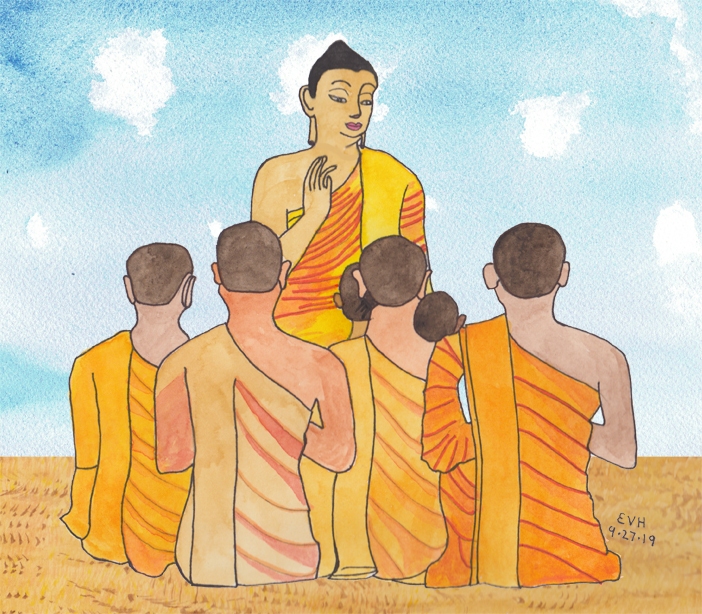
Jataka 169
Araka Jātaka
The Teacher Araka
as told by Eric Van Horn
originally translated by William Henry Denham Rouse, Cambridge University
originally edited by Professor Edward Byles Cowell, Cambridge University
Often Buddhists are guilty of putting too much emphasis on meditative achievements. The Buddha made it clear that the practices of virtue and cultivating the brahma-vihāras (mettā, compassion, empathetic joy, and equanimity) can yield just as much fruit. And trying to practice meditation without also practicing virtue is a fool’s errand.
In this story the Buddha makes it clear that attaining the ability to practice boundless and unconditional lovingkindness for all beings has great rewards.
“The heart that feels boundless compassion.” The Master told this story while he was at Jetavana. It is about the discourse on lovingkindness.
On one occasion the Master addressed the Saṇgha: “Renunciants, when you practice lovingkindness with devoted single mindedness, when you meditate on, increase, make a vehicle of progress, make your one object, practiced and well begun, you may expect to produce Eleven Blessings. What are these eleven? (1) You sleep happily. (2) You awaken happily. (3) You do not suffer bad dreams. (4) You are dear to human beings. (5) You are dear to non-human beings. (6) The devas protect you. (7) No fire or poison or weapon will harm you. (8) Your mind gets quickly concentrated. (9) Your facial expression is serene. (10) You die unperturbed. (11) And even if you fail to attain higher states (jhāna), you will at least be reborn in the Brahma world. (The Eleven Blessings also appear in AN 11.16 and “The Questions of King Milinda.”)
“Lovingkindness, renunciants, practiced with renunciation of one’s sensual desires may be expected to produce these Eleven Blessings. Praising the lovingkindness that holds these Eleven Blessings, renunciants, a monk or nun should show kindness to all creatures, whether expressly commanded or not.
“He should be a friend to the friendly, a friend to the unfriendly, and a friend to the indifferent. To all without distinction, whether expressly bidden or not, he should show lovingkindness. He should show compassion with joy and sorrow and practice equanimity. He should do his work by means of the Four Excellences (the brahma-vihāras).
By so doing he will go to Brahma’s heaven even without attaining stream-entry. By cultivating lovingkindness for seven years, wise people of old have lived in Brahma’s heaven for seven eons, each with its one period to wax and one to wane.”
(According to the PTS, this refers to the arising and falling of the “sasana,” times in which the Dharma is known but then is lost.) And he told them this story of the past.
Once upon a time in a former age, the Bodhisatta was born into a brahmin’s family. When he grew up, he abandoned his desire for sense pleasures and embraced the holy life. He attained the Four Excellences (brahma-vihāras). His name was Araka. He became a teacher, and he lived in the Himalaya region with a large body of followers.
Admonishing his band of sages, he said, “A recluse must show lovingkindness. He must be sympathetic both in joy and sorrow, and he must be full of equanimity. For this thought of lovingkindness attained by resolve prepares him for Brahma’s heaven.” And explaining the blessing of lovingkindness, he repeated these verses:
“The heart that boundless compassion feels for all things that have birth,
In heaven above, in realms below, and on this middle earth,
“Filled full of infinite compassion, infinite lovingkindness,
Such a heart can never be narrow or heartless.”

Figure: Teaching Lovingkindness
Thus the Bodhisatta taught his students on the practice of lovingkindness and its blessings. And without a moment’s interruption of his meditative absorption he was born in the heaven of Brahma. And for seven eons, each with his time to wax and wane, he was not reborn in this world.
After finishing this discourse, the Master identified the birth: “The band of sages of that time are now the Buddha’s followers, and I was the teacher Araka.”
